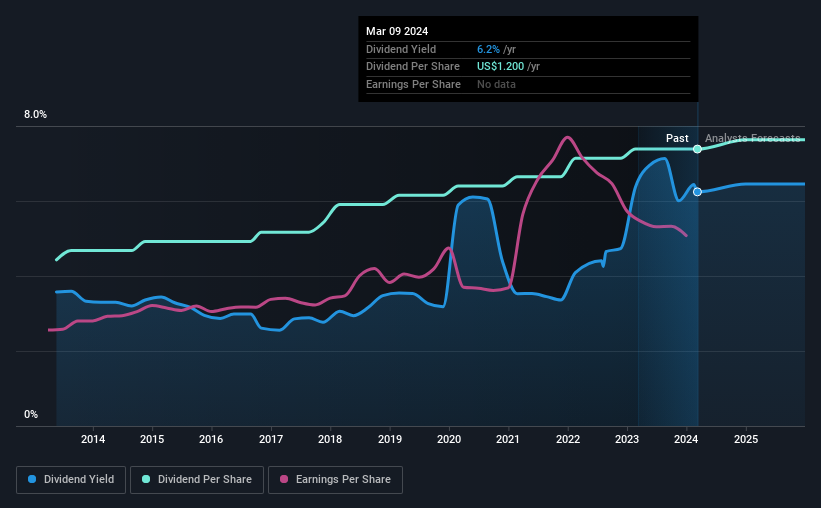- United States
- /
- Banks
- /
- NasdaqGS:FISI
Should You Buy Financial Institutions, Inc. (NASDAQ:FISI) For Its Upcoming Dividend?

Regular readers will know that we love our dividends at Simply Wall St, which is why it's exciting to see Financial Institutions, Inc. (NASDAQ:FISI) is about to trade ex-dividend in the next 4 days. The ex-dividend date is usually set to be one business day before the record date which is the cut-off date on which you must be present on the company's books as a shareholder in order to receive the dividend. The ex-dividend date is of consequence because whenever a stock is bought or sold, the trade takes at least two business day to settle. Meaning, you will need to purchase Financial Institutions' shares before the 14th of March to receive the dividend, which will be paid on the 2nd of April.
The company's upcoming dividend is US$0.30 a share, following on from the last 12 months, when the company distributed a total of US$1.20 per share to shareholders. Looking at the last 12 months of distributions, Financial Institutions has a trailing yield of approximately 6.2% on its current stock price of US$19.22. We love seeing companies pay a dividend, but it's also important to be sure that laying the golden eggs isn't going to kill our golden goose! So we need to investigate whether Financial Institutions can afford its dividend, and if the dividend could grow.
View our latest analysis for Financial Institutions
Dividends are usually paid out of company profits, so if a company pays out more than it earned then its dividend is usually at greater risk of being cut. Fortunately Financial Institutions's payout ratio is modest, at just 38% of profit.
Companies that pay out less in dividends than they earn in profits generally have more sustainable dividends. The lower the payout ratio, the more wiggle room the business has before it could be forced to cut the dividend.
Click here to see the company's payout ratio, plus analyst estimates of its future dividends.

Have Earnings And Dividends Been Growing?
Companies with consistently growing earnings per share generally make the best dividend stocks, as they usually find it easier to grow dividends per share. If earnings fall far enough, the company could be forced to cut its dividend. This is why it's a relief to see Financial Institutions earnings per share are up 5.8% per annum over the last five years.
Many investors will assess a company's dividend performance by evaluating how much the dividend payments have changed over time. Financial Institutions has delivered 5.2% dividend growth per year on average over the past 10 years. We're glad to see dividends rising alongside earnings over a number of years, which may be a sign the company intends to share the growth with shareholders.
Final Takeaway
Is Financial Institutions worth buying for its dividend? It has been growing its earnings per share somewhat in recent years, although it reinvests more than half its earnings in the business, which could suggest there are some growth projects that have not yet reached fruition. We think this is a pretty attractive combination, and would be interested in investigating Financial Institutions more closely.
Wondering what the future holds for Financial Institutions? See what the four analysts we track are forecasting, with this visualisation of its historical and future estimated earnings and cash flow
If you're in the market for strong dividend payers, we recommend checking our selection of top dividend stocks.
New: AI Stock Screener & Alerts
Our new AI Stock Screener scans the market every day to uncover opportunities.
• Dividend Powerhouses (3%+ Yield)
• Undervalued Small Caps with Insider Buying
• High growth Tech and AI Companies
Or build your own from over 50 metrics.
Have feedback on this article? Concerned about the content? Get in touch with us directly. Alternatively, email editorial-team (at) simplywallst.com.
This article by Simply Wall St is general in nature. We provide commentary based on historical data and analyst forecasts only using an unbiased methodology and our articles are not intended to be financial advice. It does not constitute a recommendation to buy or sell any stock, and does not take account of your objectives, or your financial situation. We aim to bring you long-term focused analysis driven by fundamental data. Note that our analysis may not factor in the latest price-sensitive company announcements or qualitative material. Simply Wall St has no position in any stocks mentioned.
About NasdaqGS:FISI
Financial Institutions
Operates as a holding company for the Five Star Bank, a chartered bank that provides banking and financial services to individuals, municipalities, and businesses in New York.
Flawless balance sheet, undervalued and pays a dividend.

